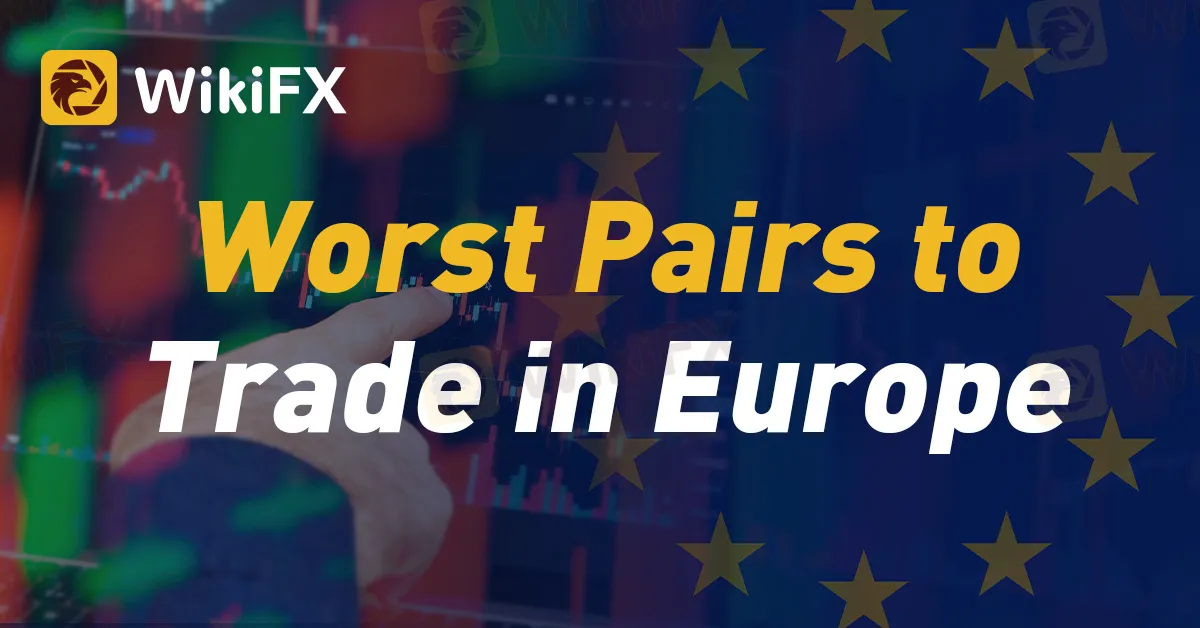简体中文
繁體中文
English
Pусский
日本語
ภาษาไทย
Tiếng Việt
Bahasa Indonesia
Español
हिन्दी
Filippiiniläinen
Français
Deutsch
Português
Türkçe
한국어
العربية
Worst Pairs to Trade in Europe
Abstract:Forex trading can be highly profitable, but not all currency pairs offer favorable conditions for traders. In this article, we'll explore some of the worst currency pairs to trade in the European forex market.

Forex trading can be highly profitable, but not all currency pairs offer favorable conditions for traders. In this article, we'll explore some of the worst currency pairs to trade in the European forex market.
Exotic Currency Pairs: Exotic currency pairs, such as USD/TRY (US Dollar against Turkish Lira) or EUR/TRY (Euro against Turkish Lira), often exhibit high volatility and unpredictable price movements, making them risky for inexperienced traders.
Illiquid Pairs: Currency pairs with low trading volume and liquidity can lead to wider bid-ask spreads and slippage, making them less attractive for trading.
Currency Pairs with High Spreads: Pairs that have significantly higher spreads, like GBP/NZD (British Pound against New Zealand Dollar) or EUR/NZD (Euro against New Zealand Dollar), can lead to increased trading costs for traders.
Currency Pairs from Economically Unstable Countries: Trading currency pairs from countries facing economic instability or geopolitical uncertainty can be risky due to potential rapid and unpredictable price swings.
Currency Pairs with Limited Market Hours: Pairs that have limited overlapping market hours can hinder traders from taking advantage of trading opportunities throughout the day.
USD/CNH: The USD/CNH pair represents the US Dollar against the Chinese Yuan. It is subject to government intervention and restrictions, leading to unexpected price movements.
GBP/AUD: The GBP/AUD pair has a reputation for significant volatility due to the diverse economic backgrounds of the United Kingdom and Australia.
EUR/SEK: The EUR/SEK pair represents the Euro against the Swedish Krona and can experience abrupt changes influenced by the Swedish economy.
JPY/CAD: The JPY/CAD pair has relatively lower liquidity and is prone to sharp price fluctuations.
AUD/CHF: The AUD/CHF pair exhibits high volatility and can lead to erratic price movements.
Traders should be cautious when trading these currency pairs and conduct thorough research before engaging in any transactions. For valuable insights and information on reliable brokers, check out WikiFX, a platform that offers essential resources for forex traders in Europe.

Disclaimer:
The views in this article only represent the author's personal views, and do not constitute investment advice on this platform. This platform does not guarantee the accuracy, completeness and timeliness of the information in the article, and will not be liable for any loss caused by the use of or reliance on the information in the article.
Read more

WikiEXPO Global Expert Interview: Advanced Practices and Insights in Financial Regulation
In the midst of rapid advancements and evolving landscapes in financial technology, financial regulation, and ensuring financial security, WikiGlobal stands at the forefront, closely tracking these transformative trends. As we embark on our series of exclusive interviews focusing on these pivotal areas, we are delighted to have had an in-depth conversation with.

Italian Regulator Warns Against 5 Websites
The Italian regulator, CONSOB has issued a warning against five websites offering unauthorized financial services. This regulatory action aims to protect the public from fraudulent activities.

Broker Review: What is FXTM exactly? Is FXTM a Scam?
FXTM is a global forex broker founded in 2011. In today’s article, we are going to show you what FXTM looks like in 2024.

Countdown to WikiEXPO Dubai 2024 — “Seeing Diversity, Trading Safely”
With the booming development of the global Fintech industry, WikiEXPO Dubai 2024, hosted by WikiGlobal and co-organized by WikiFX, will officially kick off on November 27, themed “Seeing Diversity, Trading Safely.” This event will bring together global elites to explore the future of Fintech.
WikiFX Broker
Latest News
Saxo & Portuguese Bank Partnership
SEC Fines Broker-Dealers $275K for Incomplete SAR Filings
Elon Musk Warns of Imminent US Bankruptcy | Bitcoin Retreats from $100K
UK FCA Fines Barclays £40 Million Over 2008 Deal
WikiEXPO Global Expert Interview: Advanced Practices and Insights in Financial Regulation
Justin Sun Invests $30M in Trump-Backed World Liberty Financial
Lured by False Promises: Malaysian Driver Lost RM218K to an Investment Scam
FTX Sets March 2025 Timeline for Creditor Payouts: What It Means for Investors
What is an Economic Calendar? How it works
Pros & Cons of Automated Forex Trading
Currency Calculator


